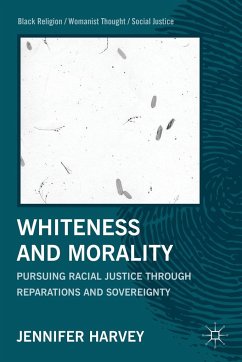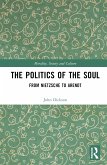What does it mean to "be white"? Harvey asks this question in order to consider how white U.S. Americans can fully participate in racial justice-making. Exploring native, African, and white relationsat two moments of U.S. history, she illustrates how "white" identities are embodiments of deeply problematic moral realities. She argues that movements for reparations for people of African descent and sovereignty for native peoples attempt to redress such realities and thus are critical for both racial justice and transformation of what it means to be white in the United States.
Hinweis: Dieser Artikel kann nur an eine deutsche Lieferadresse ausgeliefert werden.
Hinweis: Dieser Artikel kann nur an eine deutsche Lieferadresse ausgeliefert werden.
'That great unspoken among White people - racial justice - has found its voice in Jennifer Harvey. I have learned more from her work about what is due and how to think about it than from any other White American.Above all, the moral crisis of being White and American is probed more profoundly here than elsewhere,and negotiated more fruitfully for what is needed - repentance and repair.' - Larry L. Rasmussen, Reinhold Niebuhr Professor Emeritus of Social Ethics, Union Theological Seminary
'Drawing on recent interdisciplinary research and ancient moral imperatives, Harvey courageously probes deep truths of U.S. foundations in genocide and slavery. If Christian ethicists are serious about social justice, she avers, they must aggressively generate moral crises for self-named 'whites' who have maintained a nation created in extreme racial oppressions. Such disruptions encompass nation-shaking apologies and massive material reparations - the only ways those racialized as white canbecome fully human. Harvey thereby suggests tough answers to an ultimate question: Is the United States actually an illegal and morally illegitimate nation?' - Joe R. Feagin, Ella C. McFadden Professor of Liberal Arts, Texas A&M University, author of Systemic Racism
"This deeply historical inquiry into the moral crises attending white supremacy reminds us that rigor and passion coexist in the most profound studies of race. This a wonderful book to give to someone beginning to think about how race is made and how humanity is unmade. This is also full of insights for experts in the several fields brought together in Harvey's challenging work." - David Roediger, Babcock Professor of History and African American Studies, University of Illinois, author of Working Toward Whiteness
"Whiteness and Morality is one of the clearest books ever written on how white supremacy is tightly sewn into the social fabric of the United States. She proves that no worthwhile discussion of racial justice can take place unless this fact is presented and understood by those who claim to want honest racial dialogue. Her discussion on the role faith communities play in nurturing racism is nothing short of brilliant and while this may disturb some, it will liberate others into understanding that no true 'racial reconciliation' can take place in these communities unless they see reparations for the TransAtlantic Slave Trade as a precondition for true racial justice. This book is extraordinarily important in understanding the history of racism in the West and what can be done about it.Don't miss it!" - Ray Winbush, editor/author of Should America Pay?
"Weaving together the importance of white identity and justice and the necessity of reparations, Jennifer Harvey offers us the opportunity to look, with clarity and precision, at the ways in which racial justice is trumped by arrogant white supremacy.She neither romanticizes nor overstates. Rather she offers all of us a vibrant hope that in acknowledging our racial and national is-ness with the fullness of our ability to build or devastate, white U.S. Americans can, through grace, begin to build a better society with darker skinned Americans and in that process be molded into moral beings who can now step into the fullness of their humanity." - Emilie M. Townes, Andrew W. Mellon Professor of African American Religion and Theology, Yale Divinity School
'Jennifer Harvey not only makes a significant contribution to advancing the discussion of white racism in Christian social ethics, she also contributes a must-read text to several other scholarly conversations ranging from Christian missions to critical race theory. This text offers a brilliant, unflinching analysis of the 'moral crisis of being white' by examining the process of racialization in United States history, specifically in the colonization of Native Americans and the enslavement of African peoples. Harvey provides a sophisticated, nuancedtreatment of the development of white racial identity that refuses to offer excuses for the behavior of whites in this history. She insists on creating race theory with an understanding of white people as the problem but also with the capacity to participate in concrete, macro-level reparations. It's an amazing book!'
- Traci C. West, author of Disruptive Christian Ethics: When Racism and Women's Lives Matter
'Jennifer Harvey has written a powerful volume tracing the creation of whiteness, and hence White people, as a racial category in North America. As a continuation of critical race theory and especially in the critical study of whiteness, this book will become a mile-marker. It moves us decidedly down the highway of self-understanding and social transformation. Harvey's concluding argument for reparations is not just a moral statement. Rather, it is essentially a clear and coherent argument for the real healing of the White American soul.' - Tink Tinker (Osage, wazhazhe Nation), Elders' Council, American Indian Movement of Colorado; Professor of American Indian Cultures and Religious Traditions, Iliff School of Theology
'Drawing on recent interdisciplinary research and ancient moral imperatives, Harvey courageously probes deep truths of U.S. foundations in genocide and slavery. If Christian ethicists are serious about social justice, she avers, they must aggressively generate moral crises for self-named 'whites' who have maintained a nation created in extreme racial oppressions. Such disruptions encompass nation-shaking apologies and massive material reparations - the only ways those racialized as white canbecome fully human. Harvey thereby suggests tough answers to an ultimate question: Is the United States actually an illegal and morally illegitimate nation?' - Joe R. Feagin, Ella C. McFadden Professor of Liberal Arts, Texas A&M University, author of Systemic Racism
"This deeply historical inquiry into the moral crises attending white supremacy reminds us that rigor and passion coexist in the most profound studies of race. This a wonderful book to give to someone beginning to think about how race is made and how humanity is unmade. This is also full of insights for experts in the several fields brought together in Harvey's challenging work." - David Roediger, Babcock Professor of History and African American Studies, University of Illinois, author of Working Toward Whiteness
"Whiteness and Morality is one of the clearest books ever written on how white supremacy is tightly sewn into the social fabric of the United States. She proves that no worthwhile discussion of racial justice can take place unless this fact is presented and understood by those who claim to want honest racial dialogue. Her discussion on the role faith communities play in nurturing racism is nothing short of brilliant and while this may disturb some, it will liberate others into understanding that no true 'racial reconciliation' can take place in these communities unless they see reparations for the TransAtlantic Slave Trade as a precondition for true racial justice. This book is extraordinarily important in understanding the history of racism in the West and what can be done about it.Don't miss it!" - Ray Winbush, editor/author of Should America Pay?
"Weaving together the importance of white identity and justice and the necessity of reparations, Jennifer Harvey offers us the opportunity to look, with clarity and precision, at the ways in which racial justice is trumped by arrogant white supremacy.She neither romanticizes nor overstates. Rather she offers all of us a vibrant hope that in acknowledging our racial and national is-ness with the fullness of our ability to build or devastate, white U.S. Americans can, through grace, begin to build a better society with darker skinned Americans and in that process be molded into moral beings who can now step into the fullness of their humanity." - Emilie M. Townes, Andrew W. Mellon Professor of African American Religion and Theology, Yale Divinity School
'Jennifer Harvey not only makes a significant contribution to advancing the discussion of white racism in Christian social ethics, she also contributes a must-read text to several other scholarly conversations ranging from Christian missions to critical race theory. This text offers a brilliant, unflinching analysis of the 'moral crisis of being white' by examining the process of racialization in United States history, specifically in the colonization of Native Americans and the enslavement of African peoples. Harvey provides a sophisticated, nuancedtreatment of the development of white racial identity that refuses to offer excuses for the behavior of whites in this history. She insists on creating race theory with an understanding of white people as the problem but also with the capacity to participate in concrete, macro-level reparations. It's an amazing book!'
- Traci C. West, author of Disruptive Christian Ethics: When Racism and Women's Lives Matter
'Jennifer Harvey has written a powerful volume tracing the creation of whiteness, and hence White people, as a racial category in North America. As a continuation of critical race theory and especially in the critical study of whiteness, this book will become a mile-marker. It moves us decidedly down the highway of self-understanding and social transformation. Harvey's concluding argument for reparations is not just a moral statement. Rather, it is essentially a clear and coherent argument for the real healing of the White American soul.' - Tink Tinker (Osage, wazhazhe Nation), Elders' Council, American Indian Movement of Colorado; Professor of American Indian Cultures and Religious Traditions, Iliff School of Theology









